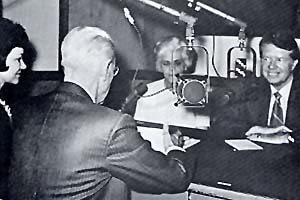“Mr. Baptist”
Louis D. Newton was known across Georgia and the South for his strong Christian beliefs and his leadership of the Baptist denomination. This is the story of a former Swainsboro school boy, who served the Lord for two-thirds of a century in a multitude of ways.
Louis Devotie Newton was born in Screven County, Georgia on April 27, 1892. One of a half dozen children of William M. and Dicie Elizabeth Newton, Louis attended the primary schools of Screven County before entering high school in Swainsboro in 1906. Louis spent many happy days of his life visiting with his sister, the wife of Rev. J.A. Reiser of Swainsboro.
A devout Baptist, Newton entered Mercer University in Macon in 1910. On his graduation from Mercer in 1913, Newton was hired to remain in Macon where he taught history at Mercer. During summer breaks, he worked toward obtaining a master’s degree from Columbia University in New York, New York.
At the age of 23, Louis Newton took the hand of Julia Carstarphen in 1915.
When Uncle Sam came calling, Newton enlisted in the United States Army. Louis served his country from his new home town of Macon by teaching soldiers in training at Camp Wheeler, which was located in the eastern end of Bibb County. It was during this time at Camp Wheeler when Newton developed a lifelong friendship with a future Bishop of the Methodist Episcopal Church South, the Rev. Arthur J. Moore.
After the war, Louis Newton turned to journalism as a career. While working for the New York World, Louis interviewed such fascinating personalities as Rudyard Kipling, John D. Rockefeller and Thomas Edison.
In 1920, Newton took a position as the editor of the Christian Index a popular publication of the Georgia Baptist Convention. After serving in that capacity for nearly all of the 1920s, his journalistic career did not end after he became a regular pastor at Druid Hills Baptist Church. Newton’s daily column, “Good Morning,” was a fixture in the Atlanta Constitution and the Savannah Morning News. His writing career spanned more than 65 years. Newton stopped writing of the Lord only when he went to Heaven to visit him.
Louis Newton knew and understood the power of radio as a tool to spread the word of the Gospel. His radio show was broadcast on Atlanta’s WGST for 57 years from 1929 until his death.
When Louis Newton accepted the pastorate of Druid Hills Baptist Church in Atlanta, he found himself in an unusual position in that he was not an ordained minister, but more than an ordinary layman. Newton was ordained shortly thereafter in his boyhood church, Union Baptist, in Screven County. Entering the ministry when he was in his late thirties, Rev. Newton served for nearly four decades from 1929 to 1968 at Druid Hills Baptist, the only church he ever served.
Rev. Newton was an unapologetic prohibitionist, fighting the evils of alcohol for most of his life. His spiritual war reached a peak in 1943, when he helped to found the Georgia Council on Moral and Civic Concerns.
After the end of World War II, Rev. Newton was named the President of the Southern Baptist Convention for a two year term from 1947-1948.
Louis Newton accepted the invitation of Russian Premier, Joseph Stalin, to visit Russia for five weeks where he would meet the heads of the of the Union of Evangelical Christians-Baptists of Russia. Newton left Russia with a favorable analysis of Russian Baptists. His remarks infuriated his critics, who branded him as sympathizing with the ideals and beliefs of the Union of Soviet Socialist Republics.
Newton was a founder of Americans United for Separation of Church and State in 1947. Newton and many other church leaders were concerned that the Federal government was becoming too involved in education by aiding the development and operation of private religious schools. For his ardent stance in favor of his beliefs and often butting heads with President Harry S. Truman, Rev. Newton was branded as a Communist. Newton quickly dispelled that accusation by publicly denouncing Communism.
Rev. Newton led the Baptists of Georgia in 195o and 1951. For a quarter of a century, the Baptist leader served as chairman of the Southern Baptist Convention’s finance committee. During his lifetime, his list of charitable projects is too long to list. Later in the 1950s, Newton was elected Vice President of the Baptist World Alliance. In 1953, Newton was chosen as American Churchman of the Year.
Newton wrote four books in his lifetime: a compilation of his weekly Atlanta Journal columns Good Morning, An American Churchman in the Soviet Union, a compilation of his columns during his 1947 tour of Russia, his autobiography Why I am a Baptist (1957), and his history of the Georgia Baptist Association Fifty Golden Years, 1909-1958.
Newton is the namesake of Newton Hall, a large chapel on the Mercer University campus in Macon, the Louis D. Newton Medal of Excellence at Shorter University and Mercer University, and the Louis D. Newton Center for the Aged at the Georgia Baptist Medical Center.
Louis D. Newton died on June 3, 1986, at the age of ninety-four, in Atlanta. Somehow the Baptist church in Georgia has never been quite the same since the death of Mr. Baptist, the man who never dreamed of being a minister, but became one of the last of the old time Baptist church leaders of his generation.



Comments